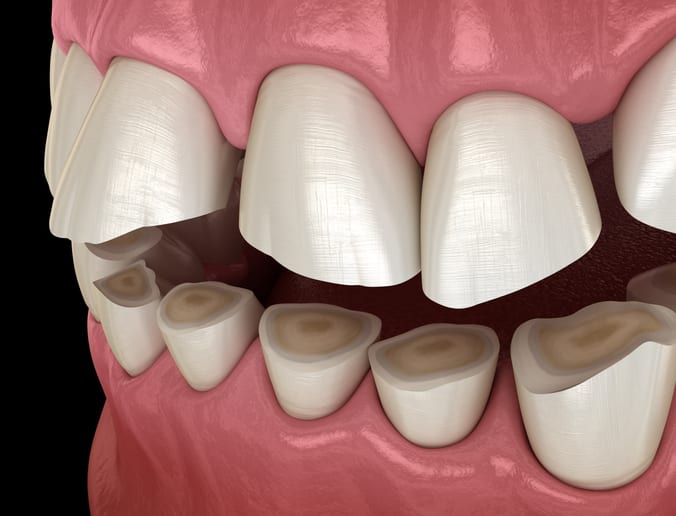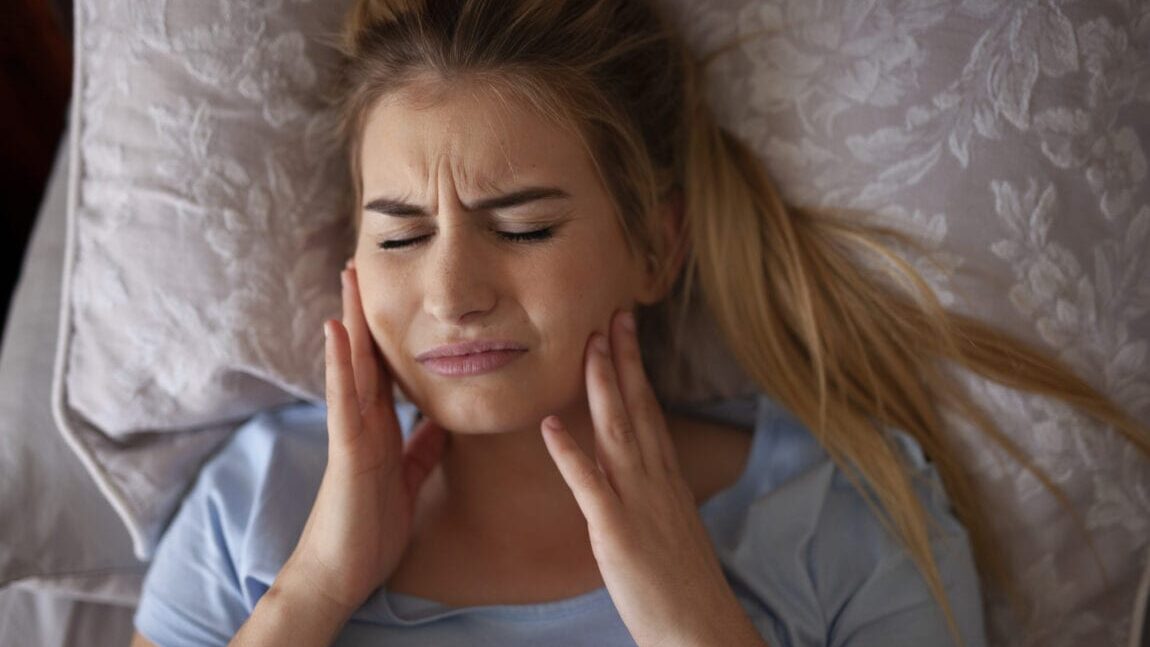Mouth Guard Options at the Dentist
Do you often wake up with a headache, stiff jaw and tooth pain? If so, you may be dealing with nighttime Bruxism (aka teeth grinding).
This sleep disorder affects nearly 10 percent of adults and 15 percent of children.
The act of grinding teeth exerts 250 pounds of force per square inch of tooth surface — so you can imagine the damage that could occur over time as your incisors and canines move laterally against each other. Or your molars rub together. Or your jaw clenches.
Teeth grinding can lead to enamel decay, broken teeth and even loss of teeth.
Signs You May Be Grinding Your Teeth
Strangely enough, Bruxism often goes undetected because the sound of teeth grinding is rarely enough to wake you up or for you to even be aware of it.
The first indication that you may have an issue usually comes from the dentists such as those at Hancock & Johnston Dentistry, who can see firsthand the damage — including tooth fractures, wearing down of enamel, gum recession, limited ability to open your mouth, and teeth yellowing.
- Stiffness/tenderness in the jaw muscles
- Pain in jaw joint
- Headaches/migraines
- Tenderness of temporal muscles (on side of head near temples)
- Earache
- Poor sleep
- Temporomandibular Joint Disorder (TMD)
- Tooth pain
- Cavities
- Teeth yellowing
- Gum recession
Source: Medical News Today, Colgate

What’s Causing Your Teeth Grinding?
Although the exact cause of Bruxism is unknown, there is evidence to suggest that stress and anxiety are to blame, as well as other sleeping disorders such as sleep apnea and snoring.
- Sleep apnea
- Snoring
- Abnormal bite
- Crooked teeth
- Alcohol use
- Nicotine use
- Excessive coffee intake
- ADHD in children and teens
- Depression
- Anxiety
- High stress levels
- Poor bite (when upper and lower teeth don’t meet correctly)
- Trauma to mouth and/or jaw
- Genetic predisposition
- Neurodegenerative disorders such as Huntington’s or Parkinson’s
- Taking antidepressants with paroxetine
Source: Sleepassociation.org, Askthedentist.com, Colgate
If you have or are experiencing any of these coupled with common Bruxism symptoms, you might want to make an appointment with the dentists at Hancock & Johnston to discuss possible nighttime teeth grinding and correction such as a mouthguard.
Mouthguards and How They Help
One of the easiest ways to alleviate the pain and damage caused by teeth grinding is to wear a mouthguard at night.
When you clench your jaw, the night guard serves as a cushion to the muscles, lessening the tension. Additionally, mouthguards keep your top and bottom teeth separated so they are unable to grind.
The next step is to figure out which mouthguard will work for you.
Which Mouthguard is Right for Me?
There are five different mouthguards, and each has its own pluses and minuses.
1. STOCK MOUTHGUARDS
You can find this mouthguard anywhere — from sports stores to drugstores — and they are ready to wear. The caveats? They come in limited sizes (small, medium, large) and do not hug your teeth.
| PROS | CONS |
|
|
Source: Askthedentist.com
2. BOIL-AND-BITE MOUTHGUARDS
Like stock mouthguards, boil-and-bite mouthguards are also sold over the counter and are inexpensive. The difference is that they come with an impression kit that allows you to boil the mouth guard and mold it to your bite.
These guards are malleable because they are made out of a flexible thermoplastic material.
| PROS | CONS |
|
|
Source: Askthedentist.com
3. CUSTOM SOFT NIGHT GUARDS
This is the most common type of guard for mild Bruxism cases. The guards are usually flexible and thin.
Your dentist will take impressions of your teeth and send them to a lab for a custom fit.
| PROS | CONS |
|
|
Source: Sleepassociation.org, Askthedentist.com
4. CUSTOM DUAL LAMINATE NIGHT GUARDS
This night guard is for those with moderately severe teeth grinding. The guards are soft on the inside and hard on the outside.
They are made from ethylene-vinyl acetate and polycarbonate.
| PROS | CONS |
|
|
Source: Sleepassociation.org, Askthedentist.com
5. CUSTOM HARD NIGHT GUARDS
This night guard is for those with severe teeth grinding and TMJ. They are made from acrylic and are very rigid. They can be used to realign the jaw.
| PROS | CONS |
|
|
Source: Sleepassociation.org, Askthedentist.com
A custom-made mouthguard is your best bet to remedy nighttime teeth grinding. They may be more expensive than the over-the-counter options, but most insurance plans will cover at least some of the cost.
Night guards can be conveniently ordered at the practice. At Hancock & Johnston, we start with a digital X-ray, then get a custom impression of your teeth in an anti-snoring position to ensure a custom fit. Then the mouthguards are created and arrive within a few weeks.
When you book an appointment with us, you’ll feel comforted in how thorough we are in discussing plans to fix your teeth grinding. We will walk you through your options and explain all the benefits to the procedures we offer.
Keep your smile sparkling for a lifetime!


